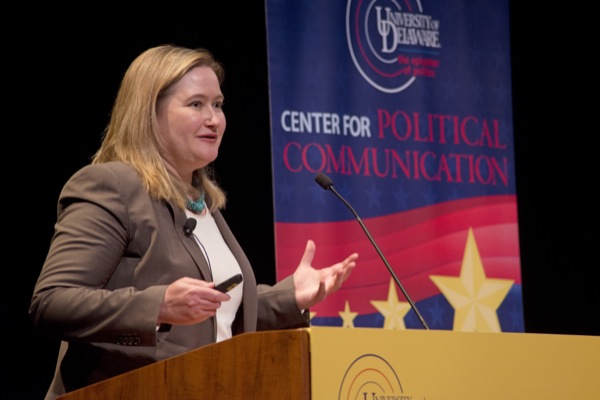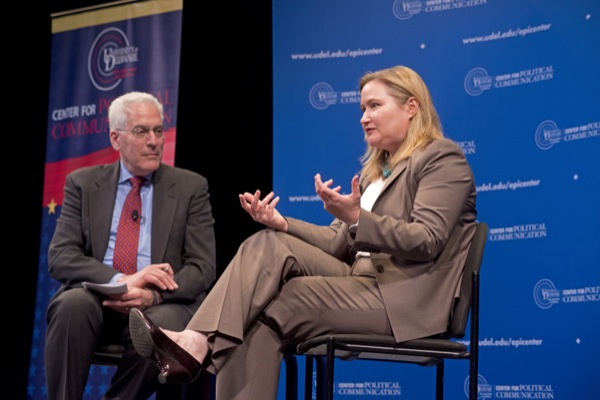Global Agenda
Internet as force for good depends on alert, active global citizenry
2:11 p.m., April 25, 2013--The Internet as a force for good depends on an alert and active world citizenry, media expert Rebecca MacKinnon told a University of Delaware Global Agenda speaker series audience on Wednesday, April 24, in Mitchell Hall.
MacKinnon, author of the book Consent of the Networked: The Worldwide Struggle for Internet Freedom and senior fellow at the New America Foundation in Washington, D.C., said the relationship between citizens and governments is increasingly mediated through the Internet and through mobile devices connected to the Internet.
People Stories
'Resilience Engineering'
Reviresco June run
And she said people cannot assume that the Internet will operate in a way that benefits the individual, mindful of human rights and geared toward democratization, adding that will only happen if people work to make it so.
Complicating the situation is the fact that citizens must deal not only with individual nations but with the large Internet companies – Google and Facebook, among them – that make decisions that impact their actual lives, not just their cyber lives.
MacKinnon said that while the nation-state, which has wielded power for centuries, still maintains clout, it is being challenged by those Internet companies, “sovereigns in cyberspace.”
She pointed out that if considered by population alone, Facebook would be the third largest “nation” on Earth, trailing only China and India.
Social media in general, and Facebook in particular, are seen as threats to national sovereignty by many non-democratic nations, including Iran and China.
China, said MacKinnon, who during her career worked in and was nearly expelled from that nation as a correspondent and bureau chief for CNN, blocks posts through what has been labeled “the Great Firewall of China” and not only bars content but actively works to keep unwanted points of view off the Internet entirely.
The democratic nations are not immune from serious Internet issues, MacKinnon said, pointing to well-intentioned but potentially dangerous legislation such as the Stop Online Piracy Act (SOPA) in the United States and the multi-national Anti-Counterfeiting Trade Agreement (ACTA).
Both have been met with organized resistance, and MacKinnon said “citizens are realizing you can’t expect everything to just work out” and that they must pay attention to the details and ramifications of proposals.
Also a problem is the sale of advanced technologies by Western companies to authoritarian regimes, which can use those technologies to track and repress dissidents.
Naïve, dangerous assumption
MacKinnon said she is concerned about “a naïve and, I would argue, dangerous assumption” that because of widespread access to the Internet around the world authoritarian countries will gradually evolve into democracies.
No one should assume that, she said. The evolution depends on the quality of laws and corporate decisions. If too many wrong decisions are made, if too many companies put the bottom line ahead of human rights issues, if too many governments restrict privacy, democracy is not a given.
“There is growing concern that if we are not careful, we are going to meet them (authoritarian regimes) in the middle,” MacKinnon said.
She said it is incumbent on democracies, and the companies in those democracies, to set a good example to the rest of the world. “If we don’t get it right here, the rest of the world won’t have much of a chance.”
MacKinnon encouraged people concerned about the future of the Internet to become active, saying, “Be citizens of the Internet just as we are citizens of our country.”
About Global Agenda
This was the final presentation of the spring 2013 Global Agenda speaker series, which had at its theme “America’s Role in the World.”
The series was moderated by Ralph Begleiter, director of UD’s Center for Political Communication, and presented by the center, the Institute for Global Studies and the departments of Communication and Political Science and International Relations.
Article by Neil Thomas
Photos by Duane Perry












